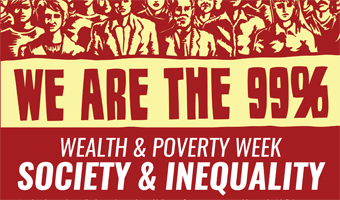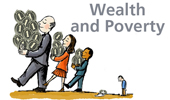The Wealth & Poverty theme hosts a two-week event—“Society and Inequality”—in February.
 America’s income inequality is growing again, and it is one of the nation’s most urgent problems—the “defining challenge of our time” in President Obama’s words. Academic and policy debates on inequality have recently moved beyond income inequality and poverty per se to explore the implications of inequality on mobility and opportunity and the relationship between economic inequalities and other sociopolitical forces.
America’s income inequality is growing again, and it is one of the nation’s most urgent problems—the “defining challenge of our time” in President Obama’s words. Academic and policy debates on inequality have recently moved beyond income inequality and poverty per se to explore the implications of inequality on mobility and opportunity and the relationship between economic inequalities and other sociopolitical forces.
The Wealth & Poverty Week on Society and Inequality examines six central aspects of inequality:
- Technology
- Entrepreneurship
- Education
- Race
- Environmental justice
- Rural communities
Wealth & Poverty Week: Society and Inequality
These events will be livecast and archived on A&S TV, with the exception of the Feb. 17 event that conflicts with a previously scheduled livestream.
- Wednesday, Feb. 10 – Dr. James Mosher (Political Science) “Long-Term Rising Inequality and Its Origin in the Competition between Education and Technological Change,” 2-3 p.m. in Alden 319—Watch on A&S TV
- Thursday, Feb. 11 – Dr. Ikenna Uzuegbunam (Business) “Entrepreneurship, Inequality and Poverty Alleviation in the United States,” 1:30-2:30 p.m. in Alden 319—Watch on A&S TV
- Monday, Feb. 15 – Dr. Elizabeth Lee (Sociology) “Inequality in the American Education Pipeline,” 1-2 p.m. in Alden 319—Watch on A&S TV
- CANCELLED: Tuesday, Feb. 16 – Dr. Vince Jungkunz (Political Science) “Racial Inequality in the US Justice System,” 1:30-2:30 p.m. in Alden 319
- Wednesday, Feb. 17 – Dr. Harold Perkins (Geography) “Environmental Justice in Appalachia? A Consideration of Race, Class, Privilege, and their Roles in Defending the Contaminated Status Quo,” 4:30-5:30 p.m. in Alden 319
- Thursday, Feb. 18 – Constantine Faller (Athens’ Own) “Small Businesses for Small Towns: Sustainable Economic Development for Small, Rural Communities,” noon-1 p.m. in Alden 301U—Watch on A&S TV
Abstracts
“Long-Term Rising Inequality and Its Origin in the Competition between Education and Technological Change”
Dr. James Mosher (Political Science
Abstract: A key political, economic, and social challenge of our age is rising income inequality. One public policy alternative available that can potentially reduce inequality is education. Increasing education can reduce inequality by reducing how much the more educated make relative to those with less education. Over the last 150 years, there has in fact been a huge upsurge in education in the United States. However, in spite of this upsurge in education, inequality in the United States has increased. Why has the upsurge in education failed to reduce income inequality? A prominent explanation for this puzzling phenomenon is the impact of technological change on income inequality. This talk explores the interesting and surprising interrelationship between education, technological change, and income inequality.
Mosher’s areas of specialization are European politics, comparative political economy, and international political economy. His research focuses on the role of the state in economic develop, the nature of cooperation in international politics, the politics of the education state, how labor power shaped wage equality in advanced industrialized democracies, how globalization affects domestic politics, how coalition politics shapes distributive politics, and the use of alternative governance mechanisms in the European Union.
“Entrepreneurship, Inequality and Poverty Alleviation in the United States”
Dr. Ikenna Uzuegbunam (Business)
Abstract: This study investigates the links between income inequality, entrepreneurial activity and poverty alleviation. First, we suggest that income inequality will tend to encourage entrepreneurial activity at the state level, by focusing theoretical attention on the potential trade-offs between opportunity costs and the pursuit of entrepreneurial opportunities. Second, we propose the notion of an entrepreneurial activity hierarchy, wherein entrepreneurial activity that embody firm-centric and opportunity-centric actions are more likely to create economic spillovers, and thus alleviating poverty at the state level, than one associated with self-employment activity. Empirical tests on a novel, panel dataset of all 50 U.S. states over an 18-year period (1996-2013) provide consistent support for the theory.
Uzuegbunam is a visiting assistant professor of strategy and entrepreneurship in the College of Business at Ohio University. Previously, he was a faculty member at the University of Kentucky. He has received several honors for his teaching and research including an honorable mention for teaching in the University of Kentucky MBA program; best paper nomination at the Strategic Management Society Conference; and the best paper award in the innovation track at the Southern Management Association Conference. His industry and consulting experience include work in medical devices, oil and gas, electronics, software, and the social sector. He holds a Ph.D. degree in management from Rensselaer Polytechnic Institute; an M.Sc. degree in technology and innovation management from the University of Sussex; and a B.Eng. (Hons.) degree in electronic engineering from the University of Nigeria, Nsukka.
“Inequality in the American Education Pipeline”
Dr. Elizabeth Lee (Sociology)
Abstract: This presentation focuses on inequality in the American educational “pipeline,” meaning the sequence of schooling followed from early childhood potentially through adulthood. While scholars, policymakers, and President Obama often focus on college as a crucial aspect of stable adult socioeconomic outcomes, inequality along race, gender, and class lines frequently derail or knock students entirely out of the pipeline well before college is even on the horizon.
Lee is a sociologist focused on social class and higher education. Her work on cultural capital, elite colleges, and socioeconomic mobility has appeared in the journals Poetics, Sociology of Education, and Sociology Compass, and she is an editor of College Students’ Experiences of Power and Marginality: Sharing Space and Negotiating Difference. Her book, Class on Campus: Managing and Experiencing Education at an Elite College, will be published this spring. Here at Ohio University, she teaches courses on the sociology of education, research techniques, social inequality, and college life.
“Racial Inequality in the US Justice System”
Dr. Vince Jungkunz (Political Science)
“Environmental Justice in Appalachia? A Consideration of Race, Class, Privilege, and their Roles in Defending the Contaminated Status Quo”
Dr. Harold Perkins (Geography)
Abstract: Perkins discusses distributional and procedural dimensions of environmental injustice in Appalachia, in relation to the wealth the region produces for people living elsewhere. He then addresses why environmental contamination that harms public health in Appalachia frequently goes unchallenged by the public, unlike other high-profile acts of contamination that generate significant public protest in other parts of the United States. Perkins ultimately argues that race and class-based modes of privilege associated with employment in dirty industry provide local residents justification for supporting polluters, despite the harm these industries do to community health. Environmental justice advocacy must overcome this tendency to be successful in white Appalachia.
Perkins is an Associate Professor of Geography at Ohio University. He earned his doctorate in the Geography Department at the University of Wisconsin-Milwaukee in 2006. He publishes on the political ecology and economy of environments, including topics of neoliberalization, the state, governance, environmental justice, and the agency of nonhuman organisms.
“Small businesses for small towns: sustainable economic development for small, rural communities”
Constantine Faller (Athens’ Own)
Abstract: This presentation explores the responsibility of business in developing solutions to the daunting challenges of this century. Healthy business needs healthy community, and business can play a vital role in strengthening community resilience. Doing so with very limited resources provides our greatest opportunity.
Faller has been a vital part of the Athens community for over a decade. His story begins with a background in engineering and culinary arts during the late ’70s. After entering the workforce and seeing many problems around the world, he decided it was time for change. He spent a number of years attending peaceful protests in addition to observing the current economic labor conditions. What if people could not go on strike for fair rights because they could not afford to? This is one of the many leading questions for a man determined to explore routes to inspire social change. In terms of workers’ rights, perhaps the economic system has not developed a suitable living wage for Americans. For Faller, this process was about developing his toolkit of resources and skills. This allowed him to employ his passion here in Athens in July, 2001, when he sold Dawn Chorus Coffee at the Richland Avenue C&E Grocery in Athens. With his first success, Athens’ Own was formed and dedicated to creating systems of sustainable community resilience. By diving into the community web, Faller has managed to gain local cooperation and partnership. Some of his business partners have already made a name for themselves as prime examples to holding the Athens’ Own sustainable model.



















Comments